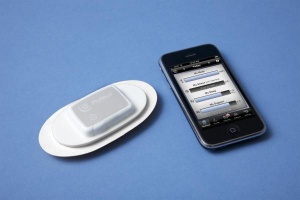 The FDA announced today that it has cleared Proteus Biomedical's wireless, adhesive sensor technology Raisin, which can track and record a patient's heart rate, physical activity, body position and other biometrics. Raisin then transmits the data via Bluetooth to a PC or mobile device. Proteus explains that the Raisin device is worn just like a bandaid.
The FDA announced today that it has cleared Proteus Biomedical's wireless, adhesive sensor technology Raisin, which can track and record a patient's heart rate, physical activity, body position and other biometrics. Raisin then transmits the data via Bluetooth to a PC or mobile device. Proteus explains that the Raisin device is worn just like a bandaid.
Raisin, however, is just one part of the intelligent medicine system that Proteus has developed, which aims to link "sensor-based formulations of pharmaceutical products to individualized physiologic response and outcomes-based treatment systems." The other key part of the Proteus Biomedical offering is its intelligent pill technology which embeds chipsets onto pills so that medication adherence can be better tracked. Proteus and partners (including Novartis) are currently piloting the technology for cardiovascular disease, psychiatric disorders, organ transplantation and infectious diseases.
As part of the FDA clearance announcement, Proteus also disclosed that it had raised $25 million in series E financing. When Proteus announced the deal with Novartis in January, it noted that Novartis had contributed $24 million as a strategic investment. It seems that return investor Medtronic and new investor ON Semiconductor made up the difference. (more from the press release).
If you haven't been tracking Proteus Biomedical's progress, here's a half dozen articles that should put the company's story into context:
Novartis invests $24M in Proteus Biomedical
Analysis: Rationale and challenges to Novartis-Proteus
Can technology address medication adherence?
Novartis, Proteus pilot to lead to exclusive deal?
@CTIA Proteus Biomedical: A $100B industry
TEDMED: iMeds will be bigger than iTunes
Proteus: China likely to swallow “smart pills” first
Two drug companies to trial Proteus this year














